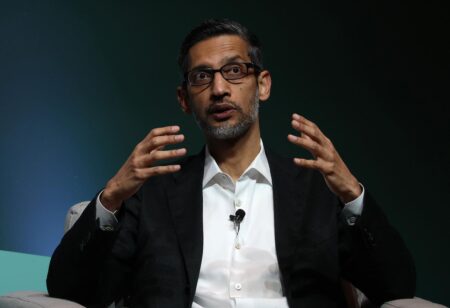Dmytro Spilka is the CEO and Founder of Solvid.
The age of artificial intelligence is already transforming recruitment at an enterprise level, and new use cases are emerging frequently. Already, the technology is showing its potential for transforming virtually every aspect of the sector.
As many as 67% of recruitment professionals believe that artificial intelligence (AI) has a positive impact on hiring beyond simply cost-cutting measures. This revolutionary technology is already transforming enterprises, with 37% of organizations now “actively integrating” or “experimenting” with generative AI tools. This represents rapid growth compared to the 27% reported one year ago, according to LinkedIn’s Future of Recruiting 2025 report.
With over a decade of experience founding, running, expanding and scaling various businesses, I know that a major part of the scaling process is streamlining and improving the quality of the talent that you hire. And AI has the potential to significantly improve the ability of recruiters to identify the most talented candidates for roles and onboard them with unprecedented ease. With this in mind, let’s explore seven ways the AI boom is transforming talent acquisition for enterprises in 2025:
1. Decision Making In The Age Of Data
Artificial intelligence empowers more recruiters to make data-driven decisions throughout the entire hiring process. AI is a driving force behind accurate predictive analytics, uniting data to identify which recruitment stages are most effective and helping recruiters allocate their resources toward driving efficiency in all the right places.
Because predictive analytics uses historical data to shape its projections, it can be used to assess the likelihood of a candidate’s long-term success in a role. By analyzing past hiring data such as tenure, performance and frequency of promotions, predictive models can align the skill sets of successful hires with prospective candidates to find the right formula for success.
2. Enhanced Screening
Modern recruiting software is capable of assessing masses of resumes and job applications in a significant time-saving manner. Programs can then search for specific keywords and phrases within CVs that are relevant to the search criteria and role. With the emergence of large language models (LLMs), this process is becoming more contextually advanced to deliver a more comprehensive overview of high-potential candidates. AI is also an excellent tool for recall, and unsuccessful candidate CVs can be seamlessly cross-checked when new roles become available in the future and are suggested using AI tools.
3. Adaptive Job Postings
Emerging technologies can be a powerful assistive tool for recruiters who are often faced with repetitive tasks such as creating numerous job postings. AI can help save time by creating purposeful job descriptions that can be easily customized for different types of candidates. This can be especially useful for creating job postings for remote roles, which automatically has a far larger pool of prospective candidates.
Fortunately, many of the best remote job websites are already actively incorporating AI tools to help recruiters create powerful copy to find the most suitable candidates without resorting to ineffective generalizations.
4. Next-Generation Interviewing
Uniting AI with VR and AR, it’s possible to convert interviews into a far more immersive experience that helps interviewers learn far more about candidates.
As much as 67% of recruiters face challenges when it comes to assessing soft skills remotely, but AI can create intuitive virtual environments where recruiters can replicate in-person interviews and even set up digital job simulations to monitor how candidates perform in true-to-life scenarios.
5. Appealing To Passive Job Seekers
One of the best ways to improve talent acquisition is to create a strategy that caters to those who aren’t actively looking for new opportunities but could be open to change. Tapping into the passive job seeker market can be enhanced by AI by tapping into data analytics across various sources like social media, professional networks, and public records to identify talented candidates who fit the right search criteria.
Using predictive analytics, AI tools can even learn who may be open to new opportunities by assessing the average tenure in their previous roles, recent promotions, engagement in industry-related content or job changes.
6. Overcoming Repetition
With 42% of recruiters believing that AI will empower them to become more strategic in their roles, it’s clear that the technology can be excellent for outsourcing repetitive tasks.
Artificial intelligence models can afford recruiters more time to focus on important areas of their job that require a human touch. This empowers more professionals to build relationships and nurture their hiring strategies based on the insights provided by artificial intelligence models.
7. Avoiding Bias
Artificial intelligence algorithms can help to overcome unconscious biases by looking at candidates based on their skills and intangible qualities alone, without the danger of overlooking skilled prospects unfairly. However, because AI models are only as unbiased as the datasets used to train them, enterprises need to adopt technology that doesn’t discriminate against any candidates based on gender, race, age or any other demographic.
Keeping HR Human
While AI can automate and optimize various elements of the recruitment process, the human element should remain irreplaceable. For instance, most current AI models can’t fully understand human emotions and show empathy. When it comes to aspects like understanding motivation, cultural fit, emotional intelligence and company vision, be sure that a trained professional is the one to evaluate this. AI can handle tasks like data analysis, scheduling, initial screenings and onboarding, but leaders must prioritize human interaction when it comes to candidate engagement.
In order to keep this balanced, businesses should provide training for recruitment teams on how to interpret the AI-gathered data and, more importantly, how to keep an unbiased view approach regardless of the conclusions/decisions AI makes. Implement feedback loops where both candidates and recruiters can reflect on the process. This can help ensure that AI supports the process rather than replaces the human experience.
Conclusion
Artificial intelligence in the recruitment process can offer plenty of benefits, but it’s important to maintain that all-important human touch when it comes to talent acquisition. This can help you maintain your enterprise’s principles and create a more personable experience that could increase the likelihood of candidates accepting job offers.
Uniting the human touch and AI is the key to a comprehensive approach to recruitment and can help prevent costly employee churn and low-quality hires in a way that can help enterprises thrive long into the future.
Forbes Business Council is the foremost growth and networking organization for business owners and leaders. Do I qualify?
Read the full article here











